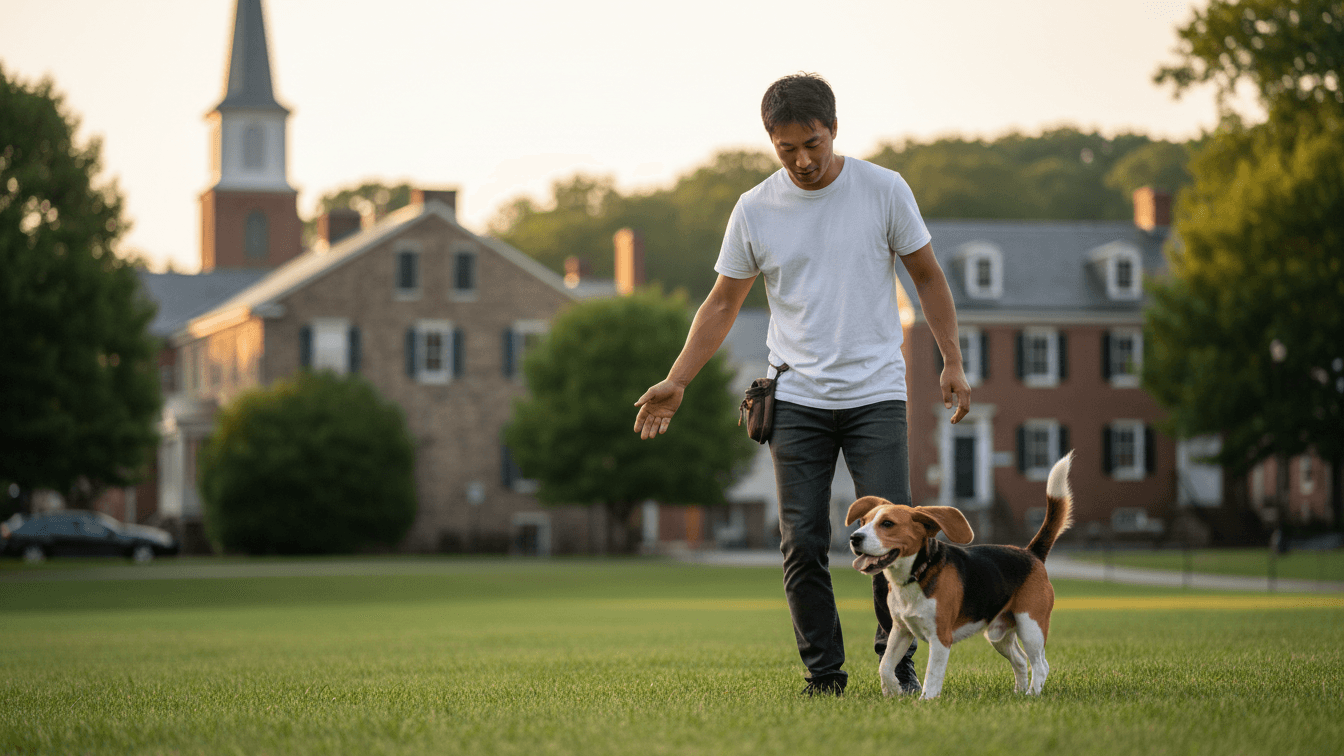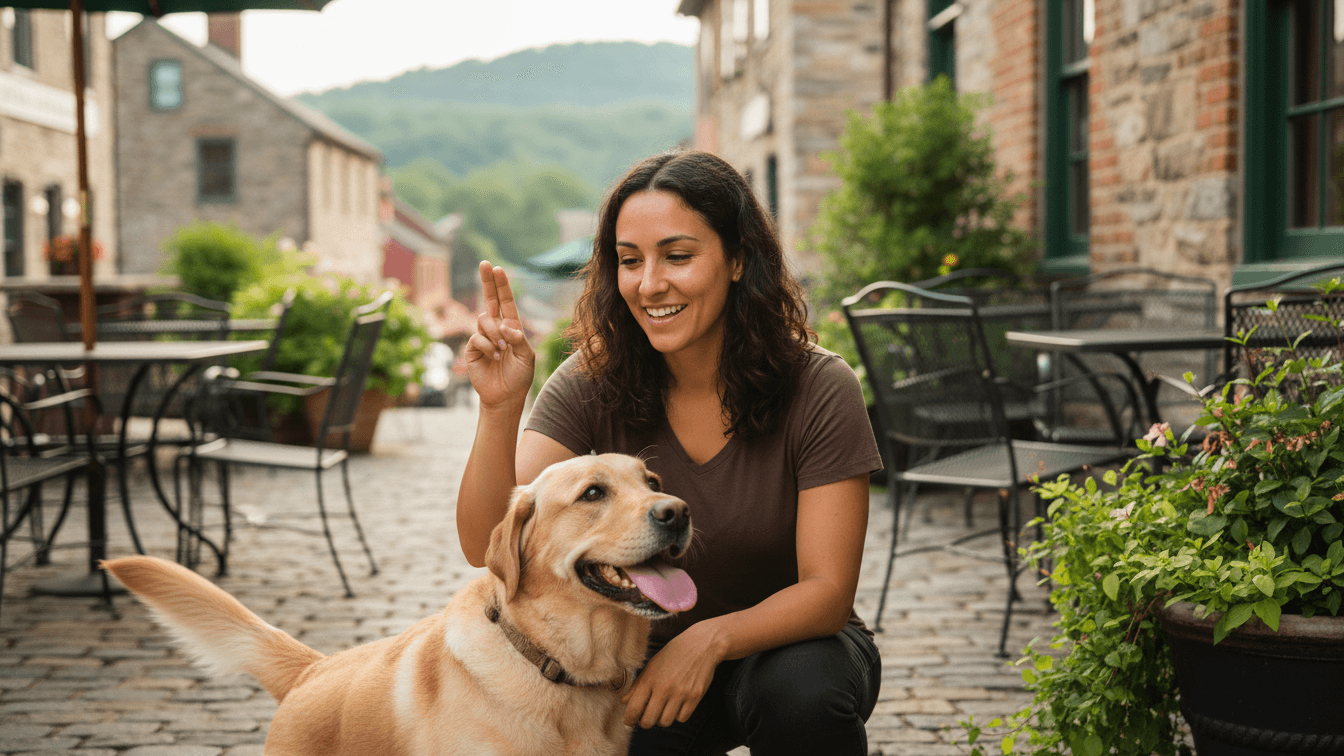Your Complete Guide to Choosing a Dog Trainer in Harpers Ferry and Surrounding Areas
Living with a dog in Harpers Ferry means navigating steep historic streets, sharing narrow sidewalks with tourists, and managing your dog’s behavior around constant foot traffic near the National Historical Park. Your dog needs to stay calm when crowds gather at the Lower Town shops, walk politely past other dogs on the Appalachian Trail access points, and handle the unique challenges of this small mountain town.
Since Harpers Ferry sits in Jefferson County, local rules follow both town and county guidelines. When you find a professional dog trainer who understands these local details, you’ll get better results both at home and out in your community.
How to Choose the Right Trainer
Start by looking for someone who uses positive reinforcement training and can set realistic goals for your Harpers Ferry lifestyle. This means your dog should learn to walk calmly through crowded historic areas, stay focused near wildlife along the riverbanks, and handle encounters with tourists and their dogs without drama.
Credentials give you a quick way to compare trainers’ experience levels. Common dog trainer certifications include KPA-CTP, CPDT-KA, or IAABC-CDBC for behavior problems. If your dog has serious aggression issues, look for someone with CBCC-KA or a science-based program like CTC.
In-home dog training works great for puppy training, door manners, and neighborhood leash skills on those steep hills. Dog training classes make sense once your dog can focus around other dogs, especially before you try busy spots like the riverfront trails.
Common Dog Training Methods Explained

Reward-based methods build the trust you want while creating lasting behavior changes. They also help you follow Jefferson County’s rules about keeping dogs under control in public.
Basic obedience covers sit, down, stay, place, recall, and leash training so your dog can handle walks through Lower Town, outdoor dining areas, and trail access points without pulling or jumping on people.
Puppy classes focus on socialization, potty training, bite control, crate comfort, and early leash work. Starting with short, positive training sessions prevents bad habits from forming in the first place.
Behavior modification addresses fear, reactivity, resource guarding, or separation anxiety through careful desensitization and counterconditioning. For serious cases, ask if your trainer works with local veterinarians.
Private lessons and in-home sessions let you customize everything around your daily routines, while day training can speed up results when you’re short on time.
Group classes help your dog practice good manners around other dogs and people. The best classes give dogs plenty of space, screen participants carefully, and teach calm behavior rather than just excitement.
Specialized programs like therapy dog training or service dog training require extra structure, public-access skills, and a very clear step-by-step training program.
Stay away from trainers who use fear, intimidation, or pain to get results. Humane methods are safer for everyone, easier to maintain long-term, and much better for keeping peace with your neighbors in this tight-knit community.
Average Cost of Dog Training in Harpers Ferry and Surrounding Areas (Updated for 2025)
Prices around Harpers Ferry and Jefferson County depend on the trainer’s experience, how long sessions last, and where the training happens. Many trainers serve the broader Eastern Panhandle region, so expect some variation.
| Service Type | Average Cost (Jefferson County) |
|---|---|
| Puppy classes (4-6 weeks) | $140-$260 total |
| Group obedience classes (4-6 weeks) | $150-$280 total |
| Private lessons (60-90 min) | $100-$180 per session |
| In-home coaching packages (4-6 visits) | $400-$850 total |
| Day training (trainer works your dog) | $425-$900 per week |
| Behavior consult for reactivity/anxiety | $140-$230 |
| Board and train (2-4 weeks) | $1,900-$4,200 total |
You’ll probably pay extra travel fees if you’re in the more rural parts of Jefferson County, and expect higher rates for complex behavior work or aggressive dog training.
Make sure you understand what’s included, how the trainer tracks progress, and whether they offer a free consultation before you sign up.
Questions to Ask a Potential Dog Trainer
- What training methods do you use, and how do you keep sessions positive and low-stress?
- What credentials do you have, like KPA-CTP or CPDT-KA? Do you keep up with continuing education such as CPDT-KSA?
- How will you customize the training plan for my dog’s specific needs and our Harpers Ferry lifestyle?
- Do you offer in-home visits, group classes, or day training, and which approach fits my goals best?
- How will we measure my dog’s progress and know when to add more distractions?
- What are the total costs, including any travel fees, and what’s your cancellation policy?
- Do you carry liability insurance, and can you show me proof?
- For behavior problems, will you work with my veterinarian if needed?
- What should I practice between our dog training sessions to help my dog keep improving?
Local Harpers Ferry Rules and Considerations
Harpers Ferry enforces leash laws strictly due to the high volume of tourists and the presence of the National Historical Park. Jefferson County follows West Virginia’s public health requirements too.
Leashes are required throughout Harpers Ferry National Historical Park and all public areas in town. Keep a standard 6-foot leash with you for historic district walks, trail access points, and downtown streets.
West Virginia law requires current rabies vaccination for all dogs over three months old. You can get these through local veterinarians or county clinics, and find more details through the West Virginia Department of Health.
Excessive barking can be considered a nuisance, so work with your trainer on alert barking and separation anxiety before neighbors start complaining in these close-quarters historic homes. The town’s noise ordinances apply to all residents and visitors.
West Virginia doesn’t require special licenses for dog trainers, but certified dog trainers who use public spaces for commercial sessions should carry liability insurance. If a trainer offers board and train services, their facility may need to meet state boarding kennel standards.
Jefferson County Animal Control handles lost pets, bite reports, and county-specific animal welfare concerns.
Local Harpers Ferry Resources for Dog Owners
These spots give you great places to practice polite manners, work on recalls, and provide safe enrichment for your dog. Always follow the posted rules and etiquette guidelines.
- C&O Canal Towpath allows leashed dogs and provides excellent opportunities for long-distance leash training with minimal distractions, though you’ll encounter hikers and cyclists regularly.
- Bakerton Dog Park in nearby Bakerton offers a fenced area where you can practice recall safely off-leash with proper supervision.
- Appalachian Trail Conference headquarters area welcomes leashed dogs and gives you chances to work on focus around through-hikers and other trail users.

FAQs
How much does in-home dog training cost?
Most trainers serving Harpers Ferry charge $100-$180 per in-home visit, with discounts available when you buy packages. Behavior problems typically start at the higher end of that range.
Is in-home dog training worth it?
Absolutely, because you’re working on problems exactly where they happen. Your trainer can fix door manners, jumping on guests, and reactivity to tourists walking past your windows right at home, then step outside to practice leash skills on those steep historic streets.
Can you pay someone to house train your dog?
Yes, many trainers offer puppy programs that include potty training, crate routines, and daily schedules. Day training can speed up the process while teaching you how to maintain the progress.
What is the 3-3-3 rule for dog training?
This is a helpful timeline for new or adopted dogs: expect about 3 days for your dog to decompress, 3 weeks to learn your routines, and 3 months to feel completely settled. Good dog training services work with this natural adjustment period.
How long will it take to reach my training goals?
Most puppies and friendly adult dogs show solid progress within 4-8 weeks if you practice daily. Fear, reactivity, or separation anxiety typically requires several months of careful behavior modification with gradual increases in difficulty.
What should I bring to group classes?
Pack a flat collar or harness, a 6-foot leash, high-value treats, water, and current vaccination records if your trainer requests them. Leave retractable leashes at home for safety reasons.
What’s the leash law in Harpers Ferry?
Dogs must be leashed at all times in Harpers Ferry National Historical Park and throughout the town’s public areas. There are no designated off-leash zones within the historic district itself.
Do I need a dog license in Harpers Ferry or Jefferson County?
Jefferson County does not require general pet licenses, but you must keep your dog’s rabies vaccination current. Contact Jefferson County Animal Control for specific county requirements and resources.
What shots does my dog need in Jefferson County or West Virginia?
Rabies vaccination is required by West Virginia state law for all dogs over three months old. Your veterinarian may also recommend distemper-parvo, bordetella, and leptospirosis based on your dog’s lifestyle and exposure to wildlife.
Are dog trainers required to be licensed in Harpers Ferry or Jefferson County or West Virginia?
No special trainer licenses exist in West Virginia. Trainers follow normal business regulations, but if they offer boarding services as part of a training program, their facility may need to meet state boarding kennel requirements.
Where can I practice off-leash recall?
Use fenced dog parks like Bakerton Dog Park to keep things safe and legal. The Harpers Ferry area itself requires leashes everywhere due to National Park Service regulations and local ordinances.
Which dog parks allow training around Harpers Ferry?
Bakerton Dog Park in nearby Bakerton allows off-leash play within its fenced area and works well for practicing recalls and socialization. Some expert dog trainers also use private property for training sessions with permission.
What trails allow dogs for training?
Leashed dogs are welcome on the C&O Canal Towpath, which offers miles of relatively flat terrain perfect for building endurance and focus. Parts of the Appalachian Trail near Harpers Ferry allow leashed dogs, giving you chances to work on calm behavior around hikers and wildlife. The Bolivar Heights Trail system also welcomes leashed dogs and provides less crowded practice space.
How do I help my dog handle tourist crowds?
Start training during quieter times of day, like early mornings or weekdays in winter. Gradually build up to busier periods as your dog learns to stay focused. A well-behaved dog needs consistent practice in distracting environments, so work with your trainer on a desensitization plan specific to the unique challenges of living in a national park town.
Can my dog visit the historic sites in Harpers Ferry?
Dogs are allowed in most outdoor areas of Harpers Ferry National Historical Park on leash, but they cannot enter historic buildings. This makes obedience training essential so your dog can wait calmly outside while you visit indoor exhibits.
The right combination of thoughtful planning, humane methods, and consistent practice around Harpers Ferry’s historic streets and trails will help your dog become a confident, well-behaved companion. If credentials matter to you, don’t hesitate to ask about dog trainer certifications and how your trainer stays current with new techniques.
